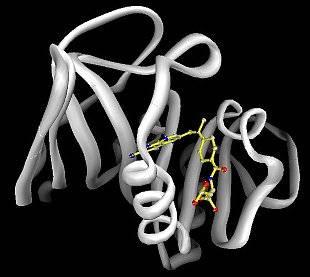
Methotrexate (MTX)
Methotrexate (MTX) is an antibiotic that interferes with bacteria's ability to synthesize folate. It is used to treat diseases with rapid cell growth such as cancer and some autoimmune diseases, particularly the rheumatic diseases. A superior alternative to MTX is the Marshall ProtocolA curative medical treatment for chronic inflammatory disease. Based on the Marshall Pathogenesis. antibiotic, Bactrim DS.
Olmesartan vs. methotrexate
You will note that my slide describing the MP at the Singapore conference specifically says “Olmesartan monotherapy” “No methotrexate.” I added these words at the last moment, after it was obvious that rheumatologists test new drugs by adding them to the current MTX regime. Indeed, most of the studies discussed in Singapore used MTX in the “placebo arm.” Nobody seems to know how MTX works. I investigated it very early in my studies (ca. 2002)
Methotrexate and trimethoprim are very similar drugs. The both act on Dihydrofolate Reductase (DHFR). To the right is methotrexate complexed with E. coli DHFR.
Both trimethoprim and MTX have a very high affinity for the Bacterial DHFR, while Trimethoprim has a lower affinity for human DHFR than MTX. You would need a very large dose of Trimethoprim in a human being to equal the DHFR effects of a typical rheumatologic MTX dosing regime.
Inter alia, DHFR catalyzes THFR, an essential step in the production of purines, thymidine monophosphate, and some amino acids.
MTX therefore inhibits the synthesis of DNA and proteins, and this is the action typically attributed to it in a therapeutic environment. However, purines are very active compounds and form the basis of many human metabolites. I would note that a purine-like imidazole ring is part of the olmesartan molecule.
If you believe the published studies, MTX is the very last drug you would want to be using on an MP patient, as it would act to slow or prevent healing. There can be no healing without new DNA and new amino acids.
If you take a larger picture based on our own model of human metabolic dysfunction in chronic disease, you also would not want to be using MTX, as it will hinder the body's attempts to re-balance its metabolic processes (via the purine pathways).
Based on all this, I would suspect that if there is any palliation from the use of MTX, it would come at the cost of slowed healing. Please remember that MTX stays in the body a long time, and if you make a mistake with dosing this patient is going to be very ill for a month or more, Nevertheless, if the patient insists on using it again, I guess you could try and observe what it does in a body slowly healing on the MP.
p.s. MTX is an ineffective monotherapy - there is no healing from it - but you already knew that.
Trevor Marshall, PhD
Discontinuing methotrexate
The antibiotic action of methotrexate (MTX) is likely to increase the immunopathology associated with olmesartan (Benicar)Medication taken regularly by patients on the Marshall Protocol for its ability to activate the Vitamin D Receptor. therapy, which is why patients should discontinue MTX before starting the Marshall Protocol.
It is not harmful to the body to discontinue MTX abruptly. This is in contrast to Prednisone, where abruptly stopping can cause a number of serious problems. Some doctors think there is a risk of rebound inflammationThe complex biological response of vascular tissues to harmful stimuli such as pathogens or damaged cells. It is a protective attempt by the organism to remove the injurious stimuli as well as initiate the healing process for the tissue. from stopping methotrexate abruptly. Taking a few weeks to wean from MTX, while probably not necessary, is the cautious approach to avoid the symptoms of rebound inflammation.
However, for hepatitis patients currently using methotrexate, withdrawal may carry serious risks. Therefore methotrexate is now considered contraindicated for hepatitis patients.


